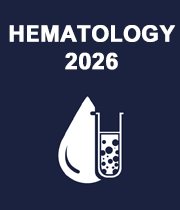Title : Can a prolonged aPTT predict a positive lupus anticoagulant in a patient with thrombosis?
Abstract:
Background: Antiphospholipid syndrome (APLS) is a hypercoagulable state characterized by thrombotic events (venous or arterial) or obstetric complications along with persistent positivity of antiphospholipid antibodies (lupus anticoagulant, anticardiolipin, or β2-glycoprotein I antibodies). The diagnosis of antiphospholipid syndrome can be challenging to make, as it requires positive antiphospholipid antibodies on two tests, taken at least 12 weeks apart. Antiphospholipid antibodies can interact with the phospholipids used in coagulation tests such as the aPTT, resulting in prolonged clotting times. Although this relationship between lupus anticoagulant and aPTT is well known, there is a lack of studies quantifying this relationship. The aim of our study was to determine if there is a significant association between aPTT and lupus anticoagulant and to determine if a prolonged aPTT predicts a positive lupus anticoagulant.
Methods: Retrospective cohort study of patients who presented with thrombosis and were tested for both an aPTT and antiphospholipid antibodies between January 1st, 2015 and April 1st 2021, who received care at the Lifespan Health System.
Results: Of the 116 patients included in this study who presented with both thrombosis and were tested for both aPTT and lupus anticoagulant, 40 patients (34%) ended up being diagnosed with APLS. The baseline characteristics of the patients, separated based on a diagnosis of APLS.
Specificity of prolonged aPTT for a positive lupus anticoagulant was found to be 96.77% and the sensitivity was found to be at 10.59%.
Coefficient of association was calculated to see if there was a significant association between the values of aPTT and the lupus anticoagulant (coefficient 0.08, 95% CI -0.05 to 0.216, p = 0.240). There was no significant association between the aPTT and lupus anticoagulant.
A logistic regression was performed to see if a prolonged aPTT of greater than 37 seconds predicted a positive lupus anticoagulant (OR 3.55, 95% CI 0.431 to 29.267, p = 0.239). A prolonged aPTT was not found to predict a positive lupus anticoagulant.
Conclusions: In our study, we saw a low sensitivity of 10.59% of a prolonged aPTT for a positive lupus anticoagulant. We found that there is not a significant association between a prolonged aPTT and a positive lupus anticoagulant in patients with acute thrombosis. A prolonged aPTT is not a good screening tool for APLS, and antiphospholipid antibodies should be obtained regardless of the value of the aPTT, whenever APLS is suspected. Limitations of our study include that it was a single center study with a small sample size, which may not have allowed for statistically significant findings.
Audience Takeaway:
- To assess the association between a prolonged PTT and a positive lupus anticoagulant
- To improve clinical practices regarding screening for APLS
- To allow for more patients to be tested for APLS and initiated on appropriate therapies



